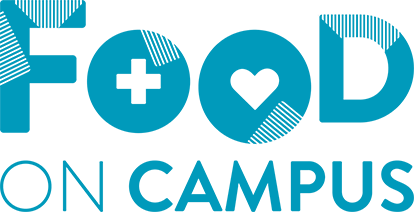We currently do and will continue to achieve:
+ Procurement
We make decisions based upon a balance between economic, social and environmental factors to achieve best value for money. Local and smaller suppliers are encouraged to participate in tendering processes and provide advice and guidance where appropriate. We also continue to increase the number of supply agreements with locally based companies and place particular emphasis on locally sourced fresh ingredients. We commit to the integration of our Sustainable Food policy requirements in contracts and tender documents when contracts expire, or a new tender process begins.
+ Drinking water
In order to provide an alternative to purchasing bottled water, mains water drinking facilities have been installed in all central food service outlets and key vending locations. All mains water installations are designed to allow customers to fill both cups and bottles. Free water is actively promoted in outlets and online with the free water map.
+ Water for meetings, functions and events
We provide filtered bottled mains water for all functions, meetings and events whenever possible
+ Seasonal fruit and vegetables
We plan menus that utilise seasonal produce grown in the UK and will always use locally grown produce when in season. Where this is not possible, in consultation with our fruit and vegetable supplier, we always seek the most suitable alternative produce. We consistently strive to increase the use of seasonal fruit and vegetables.
+ Milk
We ensure the milk we supply has been sourced from British farmers and provide a dairy free alternative in all service outlets.
+ Sustainable fish
We have discontinued purchasing any fish which are on the MCS’s red list since January 2012. In addition, we fully support the Government approved “Responsible Fishing scheme” and aim to increase our use of locally caught fish from local suppliers.
+ Increasing plant based meals
Hospitality Operations, provide a balanced range of plant-based meals. We actively promote the consumption of plant-based meals and the reduction of meat and dairy for both personal health reasons and environmental impact. All of our menus lead on vegan and vegetarian options with less prominence for fish and meat choices. Vegetarian and vegan meals are available across all services and we make use of alternative plant-based proteins such as pulses, beans and tofu, placing an emphasis on wholegrains and seasonal vegetables. A variety of our restaurants take part in Meat Free Monday promotions, and we also have a dedicated space for communicating our plant-based services.
+ Higher welfare meat
We seek to ensure that the meat we serve is, at minimum, Red Tractor assured and continue to work towards 100% of procured meat meeting higher welfare standards.
+ Fairtrade
The University received Fairtrade Status in 2018. Hospitality Operations are committed to increasing the use and sale of Fairtrade products and ingredients wherever possible and, in partnership with the Students Union, raise awareness through promotions and events. The University also sits on the Brighton and Hove Fairtrade steering group and reports upon internal Fairtrade activity and developments to the Carbon Management Programme Board. We are committed to a fair and balanced procurement, where possible we’ll buy products that support our local community and if we can’t buy local, we’ll aim to buy products that support other communities.
+ Waste and recycling
We promote a zero waste culture of ‘rethink, reduce, reuse and recycle’, in order to significantly reduce waste and increase recycling across all areas of the University estate. We actively seek to reduce the amount of packaging used in both sales items and the supply chain (i.e. we request, where possible, the use of reusable crates instead of cardboard boxes for deliveries). We are always working to reduce our food waste, and all of the food waste we do produce is sent to an anaerobic digestion facility. Our waste oil is converted into biodiesel for use in local schemes.
+ Reducing use of disposables
We are working to reduce the number of disposable items used in our outlets through the MYCUP reusable coffee cups scheme. This scheme integrates financial incentives for the use of sustainable cups and offering china mugs as the default option wherever feasible. All EAT IN catered halls dinners eaten within canteens are disposables-free, and EAT IN students are provided with re-usable coffee cups and cold drinks vessels. Reusable cutlery and crockery are provided in favour of disposables in all outlets. From 2018, a charge has been added to soup and salad containers to further reduce the amount of single use packaging going to waste. No single use plastic cups are purchased for water fountain locations and the use of wooden take away cutlery and paper straws are being integrated into all services.
+ Wellbeing
Healthy eating and the provision of food and beverages that support a healthy lifestyle are key considerations in the planning and delivery of all Hospitality Operations.
In 2016 we introduced a levy on all sugary drinks, making clear the amount of sugar in soft drinks and offering a greater choice of reduced sugar and healthy alternatives.
We promote and market healthy food and beverage choices and no longer offer meal deals and price promotions on sugary drinks.
+ Customer and stakeholder engagement
Healthy eating and the provision of food and beverages that support a healthy lifestyle are key considerations in the planning and delivery of all Hospitality Operations. In 2016 we introduced a levy on all sugary drinks, making clear the amount of sugar in soft drinks and offering a greater choice of reduced sugar and healthy alternatives. We promote and market healthy food and beverage choices and no longer offer meal deals and price promotions on sugary drinks.
+ Cutting carbon and reducing water use
We continue to work with colleagues across the University to reduce carbon emissions and water use. All kitchens have ‘Green Reps’ who take part in monthly meetings to address sustainability issues. They all also take part in the c-change Traffic Light scheme, where kitchen appliances are only switched on as and when required. We also regularly review equipment, maintenance contracts and the suitability of current food production and cold storage equipment.
+ Policy review and publication
The Sustainable Food Policy will be reviewed and updated annually. The policy will be published in a central location that can be accessed by all stakeholders.
Get in touch
Residential and Hospitality Operations welcomes your feedback on all its policies. The team will read all feedback carefully. If you provide your email address, you agree that we may contact you to better understand the comments you submitted.
Our policy document
Read our Sustainable Food Policy here.


